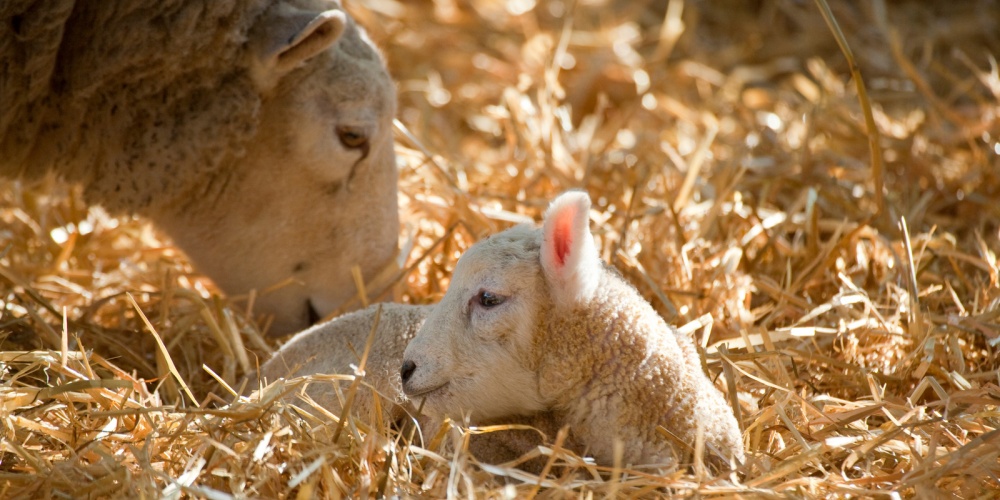
“Rabbi Shimon says: Kevasim, lambs, precede se’irim, goats, in all places” (Keritot 28a). Rabbi Shimon notes that while lambs and goats are often mentioned together, the Torah (almost) always refers to lambs first. “Is it possible [that this is] because they are preferred? Thus, the verse states: ‘And he shall bring for his offering a goat’ (Vayikra 4:28) after which it is written: ‘And if he bring a lamb as his offering for a sin offering.’” To demonstrate that there really is no preference as to whether one offers a lamb or a sheep as a korban, the Torah on this one occasion lists goats first, “to teach that they are both equal”.
As is common in Talmudic literature, we next find a series of areas where one might have thought that one item is preferred to another; thus, the Torah specifically indicates that they are equal in importance.
It is in this context that the Mishna continues, “Is it possible that the honour due to a father is greater than that due to one’s mother? As it says, ‘Honour your father and your mother[1]’. Thus, it says, ‘One should revere one’s mother and father’, to teach that both of them are equal”.
The Gemara in Kiddushin (30b) explains explains why the Torah puts the honour of the father first and the awe of the mother first. Both the honour and reverence due to a mother and a father are equal. However, the tendency of man is to honour his mother more than his father, and to revere his father more than his mother. Thus, the Torah wants to emphasize honouring fathers and revering mothers.
However, immediately after teaching that we must honour our parents equally, the Mishna notes that this is only true in theory. “But the Sages said: Honour of the father takes precedence over honour of the mother everywhere, because both the son and his mother are obligated in the honour of his father”.
From the perspective of the honour due to a parent, mother and father are equal. However, since the mother must also honour the father, when one has to make a choice` the child should serve the father first, as that act also indirectly honours the mother.
Undoubtedly, this approach conflicts with the ethos of today, including in much of the observant world. But it accurately reflects the ethos of the Talmudic period. At the same time, the halacha is that a husband must show more honour to his wife than to himself (Yevamot 62b). Presumably, this would include having the child serve the mother first, rendering the Mishna more theoretical than practical.
We should also note that the mitzvah of kavod and yirah to our parents is, in many ways, subjective; what is considered kavod or yirah in one generation is not necessarily so in the next. For example, while the Talmud prohibits a child from even expressing agreement with a parent—such implies that it may be possible to disagree—I (and I imagine many others) love it when my children challenge my views.
From honouring parents, the Mishna moves to honouring teachers. “If the son was privileged [to learn] before the teacher, the teacher takes precedence over the father, because both he and his father are obligated in the honour of his teacher[2]”. Here too, it would appear that in theory, the honour due a father (and mother) is equal to that due a teacher. But just as one must (in theory) honour one’s father more because the mother must also honour the father, so, too, one must honour a teacher more because both student and father must honour the teacher.
Left unexplained is the father’s obligation to honour his son’s teacher (and in the time of the Gemara, it was only the son). That one should honour those who teach Torah is a given. And that a father has an even greater obligation to honour a teacher is also a given; after all, the teacher is fulfilling what should be the father’s task. But that that does not easily explain why that means the son should give greater honour to his teacher than his father. For a child, a parent is akin to G-d; the Talmud notes that it takes three to create a child, G-d, a father and a mother. G-d, kviyachol, can’t do it on His own. With our parents also our creators, the honour due them is placed on the first half of the aseret hadibrot, alongside our obligations to G-d. Can it be that a father’s obligation to give some honour to a teacher overrides the son’s responsibility to his parents?
The Mishnah Torah of the Rambam is, at its core, an explication of the 613 mitzvot of the Torah. Hence, each section of halachot of the Rambam begins with a koteret, a heading, that lists the number of mitzvot, both mitzvot aseh and mitzvot lo ta’ase, that he will be detailing in the particular section of law. For example, the laws of teshuva have one positive mitzvah, “to return from one’s sin before G-d and confess”; the laws of theft have two positive mitzvot and seven prohibitions, and the laws of idolatry have a whopping 51 mitzvot, two positive and 49 prohibited actions.
In the koteret to the mitzvah of the laws of Talmud Torah, the Rambam lists two mitzvot. Not surprisingly, first and foremost is the mitzvah to learn Torah. The second mitzvah (and remember, we are talking about the laws of learning Torah) is to “respect those who teach Torah and know it”.
Part and parcel of learning Torah is honouring those who teach Torah. It thus follows that one must show greater honour to one’s teacher than even to one’s parent. If one does not show preference to one’s teacher, one’s learning will be deficient; and this on at least two levels. First, one is unlikely to actually learn all the material taught. With a diminished connection between teacher and student, one inevitably will not fully master the material. Moreover, more important than material learned is character development. One who lacks respect for one’s teacher is lacking in Talmud Torah itself, regardless of how much one may “learn”. Talmud Torah is about much more than knowing Torah[3].
With this understanding, we can now better understand the Mishna in Bava Metzia, which seemingly gives a different reason for giving precedence to one’s rebbe.
“[Between] the lost item of his father and the lost item of his teacher, his teacher’s lost item takes precedence, as his father brought him into this world, and his teacher, who taught him wisdom, brings him to life in the World to Come[4]” (Bava Metzia 33a). No amount of learning can guarantee one’s place in the World to Come[5]. It is our behaviour that matters. And it is the rebbe’s job to ensure (to the best of his ability) that a student learns much more than knowledge. The Rambam goes so far as to rule that one may not even teach Torah to one who is morally deficient. One must first work on improving that person’s middot, character development, and only then can one teach.
The above is (I hope) very nice. However, for most people, it has little practical benefit. The obligation to give precedence to a teacher over a parent applies only if the teacher teaches for free and is the primary teacher of the student. But when a parent pays for their children’s education, they are their child’s teacher. The person who stands in the classroom is no more than a shaliach, an agent of the parent. With parents paying literally hundreds of thousands of dollars to educate each of their children, it is hard to calculate the degree of honour that a child must show to a parent.
[1] Presumably, the Mishna raises this (rejected) possibility because in both sets of the aseret hadibrot, the Torah puts the father first. Had the Torah wished to demonstrate equality between the parents, it could have switched the order in the second set of dibrot.
[2] Most interestingly, the Mishna rules that if it is his object that is lost, retrieving it takes precedence over both his father and teacher.
[3] As discussed in our last post, Torah scholars must bring increased peace to this world and if not, their scholarship is deficient. This teaching is thus the perfect lead-in to that teaching.
[4] This is actually one of the very few references to the World to Come in the Talmud and, to the best of my knowledge, the only one that has a practical, real-world halachic application.
[5] The Rambam would be the first (and maybe the only) to argue that one can know kol hatorah kula, the entire Torah, backwards and forwards, but if one has incorrect theological positions, one loses one’s portion in the World to Come. Even as he rules that a terrible sinner does not automatically lose their share in the World to Come, they only get there if they repent from their serious sins.



